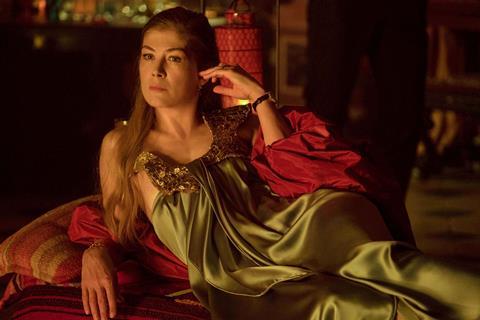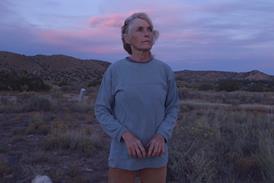Rosamund Pike’s chameleonic abilities make her an actress of extraordinary range — a range that includes the posh, narcissistic matriarch of Emerald Fennell’s Saltburn

When David Fincher was casting the role of Amy in Gone Girl, his adaptation of Gillian Flynn’s bestselling mystery novel, he wanted an actress who could keep audiences guessing. And that meant finding one who could keep him guessing, too. He chose Rosamund Pike. “I think that for a long time people couldn’t pin me down, and that was to my advantage,” says Pike. “I remember [Fincher] saying to me, ‘I can usually watch a few films of someone and pin them down, and know what they do, what’s their thing. I couldn’t do that with you. I couldn’t see what your thing was. And that’s what I need for Amy.’ Whether that’s a compliment, I don’t know. You never quite know if anything’s a compliment coming from David Fincher.”
Pike’s uncanny knack of keeping her own personality hidden far beneath the surface of her characters has allowed her to play an extraordinary range of parts in an extraordinary range of genres, beginning with a Bond movie (Die Another Day) and a Jane Austen adaptation (Pride And Prejudice), and encompassing everything from fantasy epics (Wrath Of The Titans) to heavyweight biopics (A Private War), from action thrillers (Jack Reacher) to pitch-black satires (I Care A Lot, for which she won a Golden Globe in 2021). She seems at home in all of them. “Maybe that’s what the English literature degree gave me,” she says, “the ability to understand tone, and understand different worlds that can be meaningful to us if we just find what connects us to them.”
Finding her connection to Elspeth Catton, the narcissistic matriarch in Emerald Fennell’s Saltburn, was not too difficult. Like Pike, Fennell studied English at the University of Oxford, and that is what the film’s social-climbing anti-hero Oliver (Barry Keoghan) is doing when he is introduced, so the links were already there. “I had witnessed the world [Fennell] described so brilliantly [in the screenplay],” says Pike, who was born in London to opera singer parents and was privately educated in Bristol. “By growing up in England and going to Oxford, I could take parts from different people I’d come across in my time, and they’d add up to Elspeth. I thought the film was going to be a wonderful way of pinpointing this peculiar English snobbishness that masks a tremendous vulnerability.”
The actress has now earned Golden Globe and Bafta nominations for her performance — one of the film’s five Bafta nods. Saltburn has also performed solidly at the box office, with $20.8m worldwide for Amazon MGM Studios and Warner Bros, including a sturdy $7.1m (£5.6m) in its home market of the UK and Ireland.
Instant connection
Pike’s involvement began when her agent told her that Fennell’s screenplay was “rather delicious”, and that the none-too-bright Elspeth was like an older version of Helen, Pike’s character from An Education. Pike then met Fennell, and felt “an instant connection” to the film’s writer/director/producer. “She came across as someone who would be extremely fun to work with.”
Fennell has spoken of Pike in worshipful tones. “I’m so obsessed with Rosamund,” she gushed in one interview. “She’s the coolest person who ever lived.” The feeling is somewhat mutual. “I think she’s very, very brilliant — much cleverer than me,” Pike says of Fennell. “I have a deep, deep respect for her, and I think we would have all jumped through fire for her. Her energy is so infectious that it permeates the whole crew. Everybody is aware of what her vision is, and everybody wants to achieve her vision for her.”
One key aspect of that vision, says Pike, was that the film’s comedy should come from “specificity” and “absolute truth” — that is, Elspeth should be a credible individual, rather than a caricature of generalised poshness. “There is a way in which actors can base their performances not on truth but on other performances. You sometimes get that with procedural stuff, that the cop is not based on a real cop, it’s based on a cop in another procedural. And I think that’s sometimes the case with the upper classes.
“Actors assume they know their upper-class characters from countless previous dramas,” she continues, “so therefore the portrayal is arch and not deep or real or lived or felt.” What mattered to her and her co-stars was playing “the boredom and the loneliness as much as the privilege”.
Even going beyond Fennell’s charisma and attention to detail, Saltburn was an “extraordinary shoot” with a “special atmosphere”, recalls Pike. She was keen to figure out why the crew was so happy, and while various factors contributed — not least that everyone ate lunch together on trestle tables outside the enormous country house that hosted the shoot — one was paramount. “Interestingly, when I quizzed the crew about their working experience, the number one thing they said added to their enjoyment was the fact that the producer, Josey McNamara from LuckyChap, was on the set every day, which I believe is something that he recognised as a good thing to do from [veteran producer] David Heyman. Knowing there was a producer who cared about what they were doing, who was there at all times — I think it made them feel safe and seen.”
Pike’s questioning of the crew was not just down to idle curiosity. She is the producer, as well as the star, of The Wheel Of Time, a Prime Video series based on Robert Jordan’s fantasy novels, and she was hoping to learn lessons on Saltburn that she could apply to the third series, which is about to start shooting in South Africa. Pike is also lining up projects that she will produce but not appear in, among them an adaptation of The Unwomanly Face Of War by Svetlana Alexievich, an investigative journalist who won the Nobel prize in literature in 2015.
But acting remains the priority for Pike, whose past awards trajectory includes an Oscar nomination in 2015 for Gone Girl. “I’m not wildly ambitious for myself as a producer,” she says. “Acting is my great love. It’s something that I need to do, and on a very simple level, it’s what I am. Success has been a by-product of that, and one that I didn’t anticipate, but I’m not validated by success as much as I’m validated by being allowed to do this as a job. As a young child, I knew this was what I was going to do.”
























No comments yet